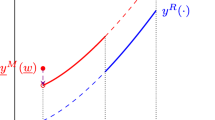Abstract.
We develop a government decision model where efficiency wage mechanisms affect the allocation of resources between different public services. We show how the introduction of interdepartment wage relativities modifies the standard Solow wage setting conditions. We compare the outcome under centralised and decentralised wage setting, and show that a decentralised wage setting system creates a distortion. Finally, we discuss the possibility of elimination this distortion using alternative financing systems.
Similar content being viewed by others
Author information
Authors and Affiliations
Corresponding author
Additional information
Final version: 08 April 2003
JEL Classification:
H23, J45
We are grateful to Jan E. Askildsen, Daniel L. Rubinfeld, Agnar Sandmo, participants at conferences and seminars in Trondheim, Uppsala and Åsgårdstrand, and several anonymous referees for helpful comments. The second author is grateful to The Norwegian Research Council for financial support. The usual disclaimer applies.
Rights and permissions
About this article
Cite this article
Johansen, K., Strøm, B. Efficiency wages, wage comparison, and public sector budgeting. Economics of Governance 4, 215–228 (2003). https://doi.org/10.1007/s10101-003-0063-5
Issue Date:
DOI: https://doi.org/10.1007/s10101-003-0063-5




